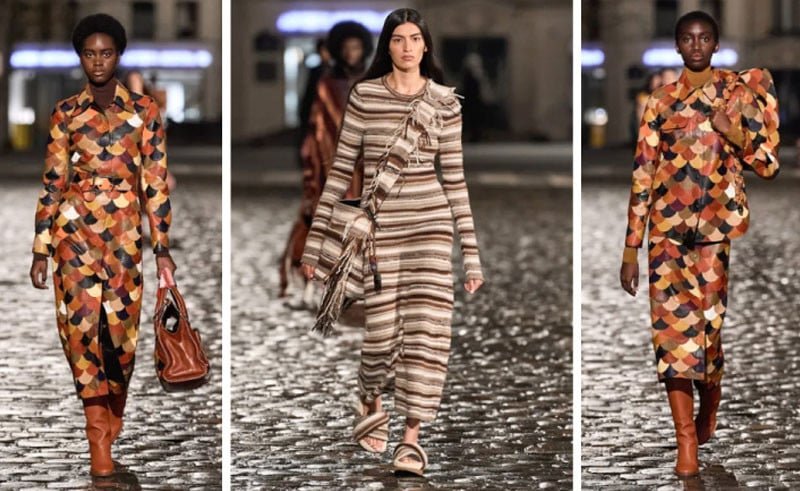Welcome to the fascinating world of sustainable fashion, where eco-friendly elegance takes center stage on the runways of 2024. In a global shift towards conscious consumerism, fashion designers are embracing materials that not only dazzle with their aesthetics but also champion the cause of environmental responsibility. This blog explores the exciting journey of sustainable and high-tech materials that have become the new stars in the fashion firmament.
Plant-Based Textiles Making Waves in 2024
One of the key players in the sustainable fashion revolution is the rise of biodegradable plant-based textiles. Designers are increasingly turning to materials like organic cotton, hemp, and bamboo, which not only reduce the environmental footprint but also offer a luxurious feel. These textiles decompose naturally, minimizing the impact on landfills and oceans.
Picture yourself in a gorgeous gown made from silky smooth bamboo fabric, knowing that your fashion choice contributes to a greener, cleaner planet. The versatility and comfort of these biodegradable materials are reshaping the fashion landscape, proving that style and sustainability can coexist harmoniously.
High-Tech Fabrics Revolutionizing the Runway
In the era of technology, fashion is not far behind in embracing innovation. High-tech fabrics are making waves on the runways of 2024, offering a glimpse into the future of wearable tech. From self-cleaning textiles to garments that can change color with a tap on your smartphone, the possibilities are as exciting as they are limitless.
These fabrics often incorporate cutting-edge materials like conductive threads and microfibers, seamlessly blending fashion with functionality. Imagine a jacket that adjusts its temperature based on the weather or a dress that charges your devices as you move. High-tech fabrics are not just a trend; they represent a bold leap into the future where fashion meets function in the most stylish way possible.
Turning Trash into Fashion Treasures
In an era marked by environmental consciousness, the fashion industry is embracing the concept of upcycling and transforming waste into wearable art. Designers are crafting stunning garments from recycled materials, giving new life to discarded fabrics, plastic, and even old clothing.
Witness the rebirth of fashion as old denim jeans become trendy jackets, and discarded plastic bottles are reincarnated into chic, sustainable dresses. This trend not only promotes sustainability but also challenges the conventional norms of beauty, proving that fashion can emerge from the most unexpected places, turning trash into runway treasures.
How Nanotechnology is Reshaping Fabric Innovation
Nanotechnology has emerged as a game-changer in fabric innovation, pushing the boundaries of what fashion materials can achieve. Nanofibers, with diameters thousands of times smaller than a human hair, are creating fabrics with unprecedented properties.
These fabrics offer enhanced durability, breathability, and even water repellency. Imagine garments that repel stains effortlessly or activewear that regulates your body temperature during workouts. Nanotechnology is not just about making fashion sleeker; it’s about transforming the very essence of our clothing, providing a glimpse into the exciting and futuristic possibilities that await the fashion industry.
Power of the Sun in Fashion
The marriage of fashion and technology reaches new heights with the integration of wearable solar tech. Designers are incorporating solar panels into clothing, allowing fashion to harness the power of the sun. Imagine charging your devices with a solar-powered handbag or wearing a dress that generates energy as you bask in sunlight.
This innovation not only adds a practical dimension to fashion but also aligns with the growing demand for sustainable energy solutions. Wearable solar tech not only turns heads on the runway but also signifies a step towards a more energy-efficient and environmentally conscious future in fashion.
Natural and Ethical Materials in Couture
The pursuit of organic luxury in fashion involves a shift towards materials that not only prioritize sustainability but also uphold ethical standards. Designers are increasingly sourcing fabrics from ethical suppliers, ensuring fair labor practices and minimal environmental impact.
Organic wool, silk, and leather, produced without harmful chemicals or pesticides, are becoming staples of high-end couture. Embracing organic luxury means not only indulging in opulent textures and designs but also contributing to a fashion industry that values both craftsmanship and responsibility.
Circular Fashion and the Era of Reusable Textiles
Circular fashion is rewriting the rules of the fashion industry by prioritizing a closed-loop system, where garments are designed to be reused, recycled, or upcycled at the end of their life cycle. This sustainable approach minimizes waste and promotes a more responsible consumption model.
Imagine a world where your favorite fashion piece doesn’t end up in a landfill but transforms into a new creation. Circular fashion encourages both designers and consumers to view clothing as valuable resources, fostering a more mindful and cyclical approach to style that aligns with the principles of a circular economy.
Mushroom Leather and Algae-Based Fabrics
Nature takes center stage in the innovative materials spotlight, with designers exploring alternatives like mushroom leather (mycelium) and algae-based fabrics. These materials offer a cruelty-free and sustainable option, mirroring the texture and durability of traditional leather and synthetic textiles.
Mushroom leather, grown from mycelium networks, is not only biodegradable but also requires fewer resources to produce compared to conventional leather. Algae-based fabrics are another eco-friendly option, providing a unique aesthetic while minimizing environmental impact. As fashion embraces these innovative materials, it signals a shift towards a more harmonious relationship between style and nature in the quest for sustainable couture.
Tech-Infused Textiles
The intersection of fashion and sustainable technology gives rise to a new era where garments go beyond aesthetics and actively contribute to our daily lives. Smart textiles embedded with sensors, conductive fibers, and interactive elements are redefining the way we experience fashion. Imagine a dress that monitors your health or a jacket that responds to environmental changes.
Tech-infused textiles not only enhance the functionality of fashion but also pave the way for a more connected and technologically advanced wardrobe. As fashion becomes an integral part of the Internet of Things (IoT), the boundaries between style and technology continue to blur in exciting and innovative ways.
Zero-Waste Couture
Zero-waste couture is a revolutionary approach to fashion design that aims to eliminate textile waste throughout the production process. Designers meticulously plan patterns and garment construction to utilize fabric efficiently, leaving little to no scraps behind. This eco-conscious strategy not only reduces environmental impact but also challenges the traditional norms of fast fashion.
Picture a gown that seamlessly weaves together fabric pieces, creating a masterpiece without a single scrap left on the cutting room floor. Zero-waste couture not only showcases the creativity of designers but also sets a new standard for sustainable and responsible fashion production.
Demand for Sustainable Fashion in 2024
In the evolving landscape of fashion, consumer consciousness plays a pivotal role in shaping industry practices. The increasing demand for sustainable fashion has led to a shift in consumer behavior, encouraging brands to prioritize transparency, ethical sourcing, and environmentally friendly practices. Consumers are becoming more informed, seeking out brands that align with their values and contribute to positive social and environmental impacts.
This shift in mindset is transforming the fashion industry, urging brands to adopt sustainable practices, and empowering consumers to make mindful choices. As we navigate the demand for sustainable fashion in 2024, it becomes evident that the choices we make as consumers have the power to drive positive change and shape the future of the fashion industry.
The landscape of fashion in 2024 is not just about style and trends; it’s a dynamic fusion of innovation, sustainability, and conscious choices. From biodegradable bliss to tech-infused textiles, the fashion industry is undergoing a transformative journey that reflects a commitment to a more responsible and eco-friendly future. As consumers, designers, and industry leaders join forces, the runway becomes a platform for showcasing not only creativity but also a collective dedication to a more sustainable and ethical world of fashion.

